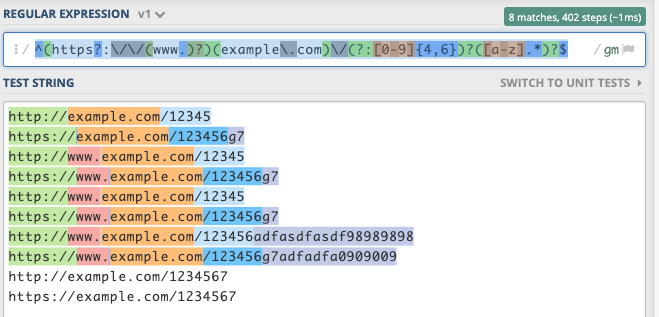用于匹配4-6位ID的URL的RegEx
用于匹配4-6位ID的URL的RegEx
提问于 2019-05-18 00:06:07
我试图匹配以"example.com/"开头的URL,后面跟着4-6位数字,下一个字符不是数字(如果有下一个字符)。
例如,"example.com/12345"应该匹配。
"example.com/1234567"不应该匹配。
"example.com/123456g7"应该匹配。
我尝试过"example.com/(\d{4,6}).*",但是当我给它"example.com/1234567"时,它与它匹配,这是不正确的。
我该如何解决这个问题?
回答 3
Stack Overflow用户
发布于 2019-05-18 02:27:06
该表达式添加额外的边界,只为了安全地传递所需的URL:
^(https?:\/\/(www.)?)(example\.com)\/(?:[0-9]{4,6})?([a-z].*)?$如果你愿意,你可以减少界限。在这里,我们可以添加几个捕获组来简单地进行调用。
$是你不想要的URL输入失败的关键。

RegEx
如果这不是您想要的表达式,则可以修改/更改regex101.com中的表达式。
RegEx电路
您还可以在jex.im中可视化表达式。

JavaScript演示
const regex = /^(https?:\/\/(www.)?)(example\.com)\/(?:[0-9]{4,6})?([a-z].*)?$/gm;
const str = `http://example.com/12345
https://example.com/123456g7
http://www.example.com/12345
https://www.example.com/123456g7
http://www.example.com/12345
https://www.example.com/123456g7
http://www.example.com/123456adfasdfasdf98989898
https://www.example.com/123456g7adfadfa0909009
http://example.com/1234567
https://example.com/1234567`;
let m;
while ((m = regex.exec(str)) !== null) {
// This is necessary to avoid infinite loops with zero-width matches
if (m.index === regex.lastIndex) {
regex.lastIndex++;
}
// The result can be accessed through the `m`-variable.
m.forEach((match, groupIndex) => {
console.log(`Found match, group ${groupIndex}: ${match}`);
});
}
Python测试
# coding=utf8
# the above tag defines encoding for this document and is for Python 2.x compatibility
import re
regex = r"^(https?:\/\/(www.)?)(example\.com)\/(?:[0-9]{4,6})?([a-z].*)?$"
test_str = ("http://example.com/12345\n"
"https://example.com/123456g7\n"
"http://www.example.com/12345\n"
"https://www.example.com/123456g7\n"
"http://www.example.com/12345\n"
"https://www.example.com/123456g7\n"
"http://www.example.com/123456adfasdfasdf98989898\n"
"https://www.example.com/123456g7adfadfa0909009\n"
"http://example.com/1234567\n"
"https://example.com/1234567")
matches = re.finditer(regex, test_str, re.MULTILINE)
for matchNum, match in enumerate(matches, start=1):
print ("Match {matchNum} was found at {start}-{end}: {match}".format(matchNum = matchNum, start = match.start(), end = match.end(), match = match.group()))
for groupNum in range(0, len(match.groups())):
groupNum = groupNum + 1
print ("Group {groupNum} found at {start}-{end}: {group}".format(groupNum = groupNum, start = match.start(groupNum), end = match.end(groupNum), group = match.group(groupNum)))
# Note: for Python 2.7 compatibility, use ur"" to prefix the regex and u"" to prefix the test string and substitution.Stack Overflow用户
发布于 2019-05-18 00:07:51
Stack Overflow用户
发布于 2019-05-18 01:37:52
另一种方法。
^example\.com/(\d{4,6})(?:\D.*)?$
页面原文内容由Stack Overflow提供。腾讯云小微IT领域专用引擎提供翻译支持
原文链接:
https://stackoverflow.com/questions/56194906
复制相关文章
相似问题

